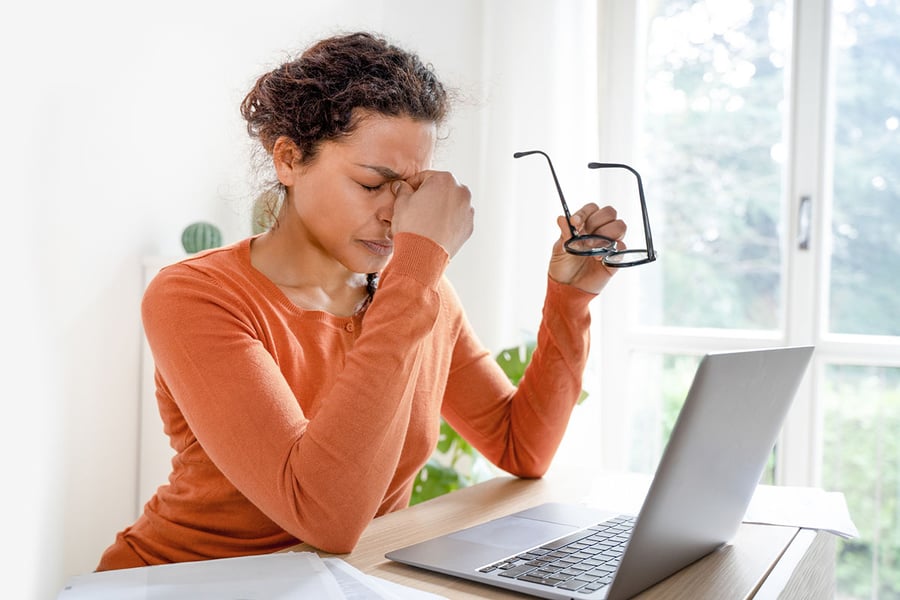Stress and Mental Health: Burnout Is a Growing Problem
April 19, 2022 Posted by Jesse M. Ehrenfeld, MD, MPH

To explore more Coffee Conversations with Scientists episodes, click here.
Are you feeling tired and overwhelmed? You’re not alone.
We’re facing a national crisis of stress and mental health issues. In particular, human services employees, first responders, and educators face a high risk of stress and burnout.
Today, some pandemic indicators are improving. But we’re not seeing a reduction in stress, according to the American Psychological Association. In 2022, the rates of stress, anxiety, and burnout are through the roof.
These conditions are made worse by the polarized response to COVID-19 prevention and by the prolonged reality of loss.
What kinds of systemic and personal changes can community leaders and workers make to reduce stress and avoid the consequences of burnout?
The Stress of the Pandemic
Why are people experiencing so much stress, even as the pandemic numbers improve?
- Loss. Many people lost loved ones to COVID-19. And even those who didn’t still experienced a huge amount of loss, says Dr. David Cipriano, associate professor of psychiatry at Medical College of Wisconsin (MCW). “Not only our social contacts, but our rituals and celebrations in many forms. We’re no longer able to celebrate these milestones, things like graduation and holidays.” Young people missed out on important social milestones, sports, and exchange programs. Adults lost ground at work, and we all lost chances to rest, relax, and socialize.
- Worry and uncertainty. For many, the uncertainties of the pandemic caused a great deal of worry and stress. Parents worried about children, children worried about elderly parents, and everyone worried (and argued) about the best ways to protect ourselves from the virus. And even when the pandemic seems like it’s subsiding, a new variant threatens to shut everything down again.
- Frustration. In the past two years, nearly everyone has felt frustrated with interruptions and barriers to everyday experiences and activities. Many people are discouraged about the divisions in our society over how to deal with the pandemic. And in the middle of all that, our country faced a long-overdue reconciliation with our racist past.
It’s a lot to process.
And many front-line health care workers were so busy working overtime to save lives that they neglected themselves. Some of these folks might be having a delayed reaction to the stress of the pandemic.
The Science of Stress
What happens in our brain when we feel stressed?
In this episode of Coffee Conversations with Scientists, Dr. Cipriano explains that the body’s initial response to stress is activation of the sympathetic-adrenal-medullary system. Our sympathetic nervous system perceives a stressor and triggers the production of stress hormones like epinephrine (adrenaline) and norepinephrine.
It’s also called “fight-or-flight.” Imagine you are driving a car when a bike pulls out in front of you. Your whole system goes into overdrive.
For longer term stressors, the adrenal cortex gets involved releasing cortisol, which while energizing and promoting all sorts of healing, can over time lead to health problems such as sleep disruption, immune suppression, muscle tension and memory retrieval problems.
At the same time, serotonin, what Dr. Cipriano calls “the feel-good neurotransmitter,” is decreased, which means our mood and anxiety can worsen.
While all of this has been happening subconsciously, pretty soon our prefrontal cortex starts firing which means now we are consciously appraising the situation and making a decision about what action to take, like hitting the brakes in the case of the bike.
What Is Burnout?
Burnout is defined as workplace-related stress that is not being successfully managed, according to the World Health Organization.
It’s an occupational issue, not a medical condition. But that doesn’t make it any less difficult to manage, and it’s definitely something that occurs among people who dedicate their professional lives to serving others.
Burnout is characterized by 3 dimensions:
- Feeling depleted or exhausted
- Experiencing mental distance from your job, or feelings of negativity or cynicism related to the job
- Reduced professional efficacy
Unfortunately, too many people are feeling exhausted and not effective at their jobs.
Burnout Rising
In a report issued on January 1, 2022, the American Psychological Association released the results of its 2021 Work and Well-being Survey. They polled 1,501 adult workers in the U.S. and found that a full 79% of them experienced work-related stress in the previous month. The survey also found the following:
- 26% reported lack of interest, motivation, or energy at work
- 19% reported a lack of effort
- 36% reported cognitive weariness
- 32% reported emotional exhaustion
- 44% reported physical fatigue (a 38% increase from 2019)
The numbers reporting burnout symptoms were higher in caretaking professionals, like teachers and health care workers.
Systemic Approaches
Most determinants of burnout are systemic or organizational, which means they are related to the systems people work within.
To reduce burnout, some companies and industries are responding by increasing time off or offering after-school tutoring and childcare. The Office of Clinician Well-Being at the University of Missouri School of Medicine is developing a program to prevent burnout in health care settings. They’re focusing on developing a culture of wellness, increasing efficiency, and promoting personal resilience and wellness practices.
It’s an approach that is careful to not blame the victim for feeling burned out. “It’s not you that's broken, or deficient—we have to fix systems,” says Dr. Cipriano.
While advocating for systems that promote wellness, people also can learn techniques to reduce the amount of stress in their lives and jobs.
Tips for Coping with Stress
Here are some ideas for reducing stress and burnout, from the Centers for Disease Control and Science Times article “This Year, Try Spring Cleaning Your Brain.”
- Take news breaks. These days, with a violent war raging in Europe, climate crisis, and the ongoing loss of the pandemic, it’s a good idea to manage your media and social media consumption. The New York Times calls it “reducing information overload.”
- Take care of your mind-body. Learn to take deep breaths, and explore mindfulness techniques like meditation and yoga.
- Eat well. Consume healthy, well-balanced meals, and exercise regularly. It’s also important to get plenty of sleep and avoid excessive alcohol, tobacco, and substance use.
- Get up. If you’re working at a desk for many hours a day, this Anti-Sitting Workshop video offers tips for unwinding the harmful impacts of sitting.
- Stay healthy. Visit your doctor regularly. Getting vaccinated against COVID-19 can reduce the stress of worrying about getting seriously ill.
- Try journaling. Studies have found that certain kinds of journaling, like the bullet journal method, can increase well-being.
- Declutter your personal space. Tackling the mess of excess stuff that surrounds most of us can be satisfying and improve your outlook.
- Connect with people and communities who care. Many people experienced social isolation during the pandemic, and we can find joy and healing in reconnecting now that some pandemic restrictions are lifting.
Don’t Wait to Talk about Stress and Burnout
Stress and burnout are not mental health conditions, but they are serious issues that need attention.
Dr. Cipriano says it’s important to seek help for stress or related mental health challenges, and avoid waiting until the problems are serious.
He recommends looking at how the stress is affecting your day-to-day functioning. Consider things like mood, energy, difficulty concentrating, or losing interest in things you used to enjoy.
“You don’t have to feel that way,” says Dr. Cipriano. “Don’t wait for a major diagnosis; the earlier the better — come on in.”




